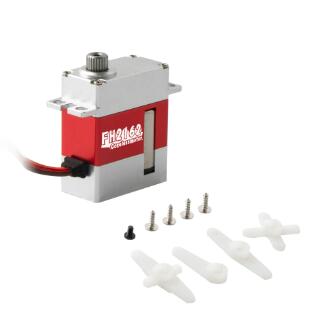Exploring the Key Advantages of Closed-Loop Control in Servo Systems
2024-08-07
In the realm of automation and precision engineering, servo systems equipped with closed-loop control technology stand out for their ability to deliver unparalleled accuracy, responsiveness, and reliability. This blog dives deeper into the advantages of closed-loop control in servo systems, highlighting how this technology enhances performance across various industrial applications.
1. Precision and Accuracy
Closed-loop control systems in servo technology excel in maintaining precise positioning and motion control. By continuously comparing the actual position or velocity feedback with the desired setpoint, these systems can make real-time adjustments to minimize errors. This precision is crucial in industries such as manufacturing, robotics, and aerospace, where even slight deviations can impact product quality or process efficiency.
2. Enhanced Stability and Smooth Operation
One of the primary advantages of closed-loop control is its ability to enhance system stability. The feedback loop allows servo systems to compensate for disturbances, variations in load, or changes in operating conditions swiftly and effectively. This capability minimizes oscillations, reduces overshoots, and ensures smooth operation throughout the entire operational range.
3. Fast Response to Dynamic Changes
Servo systems with closed-loop control exhibit rapid response times to dynamic changes in setpoints or external conditions. Whether adjusting to sudden load variations or executing precise movements in high-speed applications, closed-loop control enables servo motors to maintain optimal performance with minimal lag time. This responsiveness is critical in industries where agility and adaptability are paramount.
4. Improved Energy Efficiency
Closed-loop control contributes to energy efficiency in servo systems by optimizing motor performance based on real-time feedback. By adjusting torque and speed according to actual operating conditions, these systems minimize unnecessary energy consumption and reduce overall power usage. This not only lowers operational costs but also contributes to sustainability efforts by conserving resources.
5. Longevity of Mechanical Components
The precise control provided by closed-loop systems helps mitigate wear and tear on mechanical components, such as gears, bearings, and drive mechanisms. By minimizing unnecessary movements and optimizing operational parameters, closed-loop control extends the lifespan of servo systems. This reduces maintenance requirements, downtime for repairs, and replacement costs, ultimately enhancing the return on investment (ROI) for industrial operators.
6. Real-Time Monitoring and Diagnostics
Closed-loop servo systems enable real-time monitoring of performance metrics and diagnostics. Operators can access detailed feedback data to monitor system health, identify potential issues early, and implement proactive maintenance strategies. This proactive approach enhances reliability, minimizes downtime, and improves overall equipment effectiveness (OEE) by ensuring continuous operation and optimal performance.
Conclusion
Closed-loop control technology represents a cornerstone of modern servo systems, offering substantial advantages in terms of precision, stability, responsiveness, energy efficiency, and longevity of mechanical components. Whether in manufacturing, automation, robotics, or other industrial applications, the benefits of closed-loop control enable servo systems to meet the demanding requirements of today's dynamic operational environments. Embracing this advanced technology not only enhances operational performance but also positions industries for continued innovation and competitiveness in the global market.



